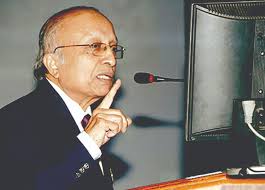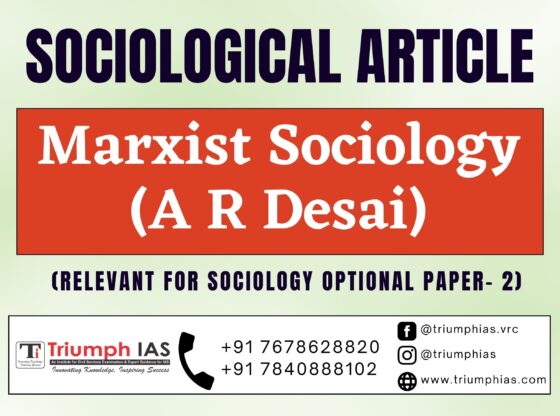Marxist Sociology (A R Desai)
Relevant for sociology optional Paper- 2 (Unit- 11 : Introducing Indian Society)

The study of Indian society has been influenced by a variety of perspectives and approaches. One of these perspectives is Marxist sociology, which was developed by A.R. Desai. This approach views society as a product of economic and class relations, and argues that social inequality and oppression are rooted in the economic structure of society. In this essay, we will examine Desai’s perspective on the study of Indian society, his approach to Marxist sociology, and the impact of his work on the field of sociology.
Desai’s perspective on the study of Indian society was influenced by his background as a Marxist activist and scholar. He believed that the study of Indian society needed to be grounded in an analysis of its economic and class relations. He argued that Indian society was characterized by deep social and economic inequalities that were rooted in its capitalist economic system. He believed that these inequalities could only be addressed through a radical transformation of the economic system and the overthrow of capitalist class rule.
Desai’s approach to Marxist sociology was grounded in the belief that society was shaped by economic relations, and that class struggle was the primary driving force of social change. He argued that social inequality and oppression were rooted in the economic structure of society, and that they could only be overcome through a radical transformation of that structure. He believed that the working class had the potential to overthrow the capitalist class and to create a more just and equal society.
One of the key themes in Desai’s work was the concept of “semi-feudalism.” He argued that Indian society was characterized by a combination of capitalist and feudal economic relations, which he referred to as semi-feudalism. He believed that this economic system was responsible for the deep social and economic inequalities in Indian society, and that it needed to be transformed through a radical socialist revolution.
Desai’s work on semi-feudalism has been both praised and criticized. Some scholars have argued that his concept is too simplistic and fails to capture the complexity and diversity of Indian society. Others have criticized him for his focus on class, arguing that he ignored other important factors, such as caste, religion, and gender.
Despite these criticisms, Desai’s work had a significant impact on the field of sociology. His approach to Marxist sociology provided a new framework for understanding Indian society that took into account it’s economic and class relations. His work on semi-feudalism helped to popularize the study of economic relations in Indian society and provided a foundation for further research in this area.
In conclusion, A.R. Desai’s perspective on the study of Indian society has had a significant impact on the field of sociology. His approach to Marxist sociology provided a new framework for understanding Indian society that took into account it’s economic and class relations. While his work on semi-feudalism has been both praised and criticized, it helped to popularize the study of economic relations in Indian society and provided a foundation for further research in this area. Overall, Desai’s contributions to the field of sociology have been significant and continue to influence scholars today.
For more such free UPSC notes, Articles, News & Views Join our Telegram Channel. https://t.me/triumphias
Click the link below to see the details about the UPSC – Civils courses offered by Triumph IAS. https://triumphias.com/pages-all-courses.php


